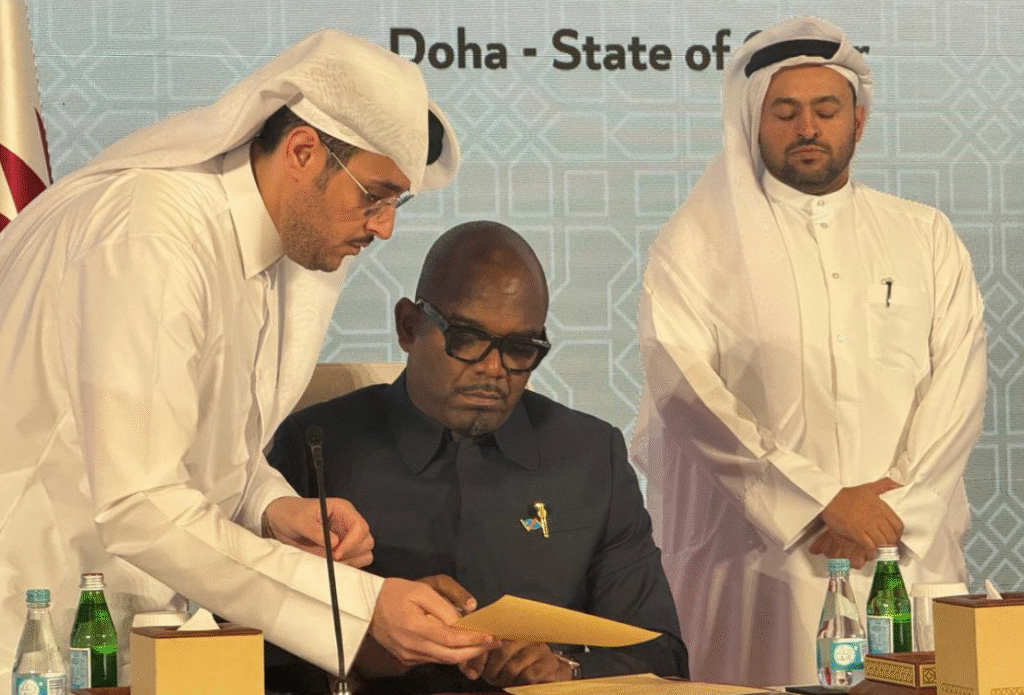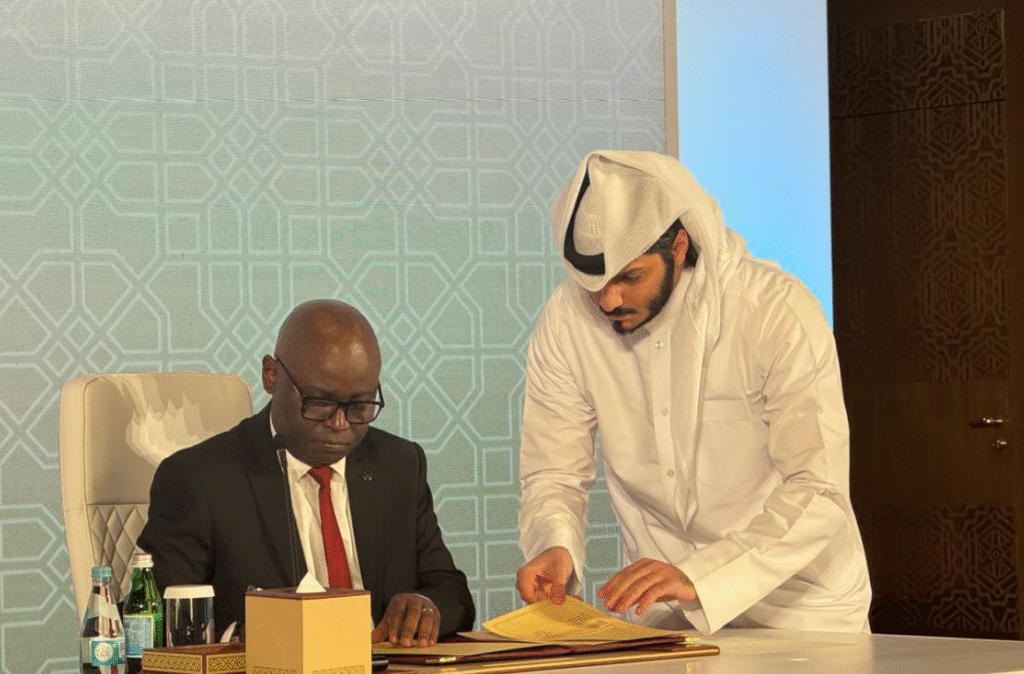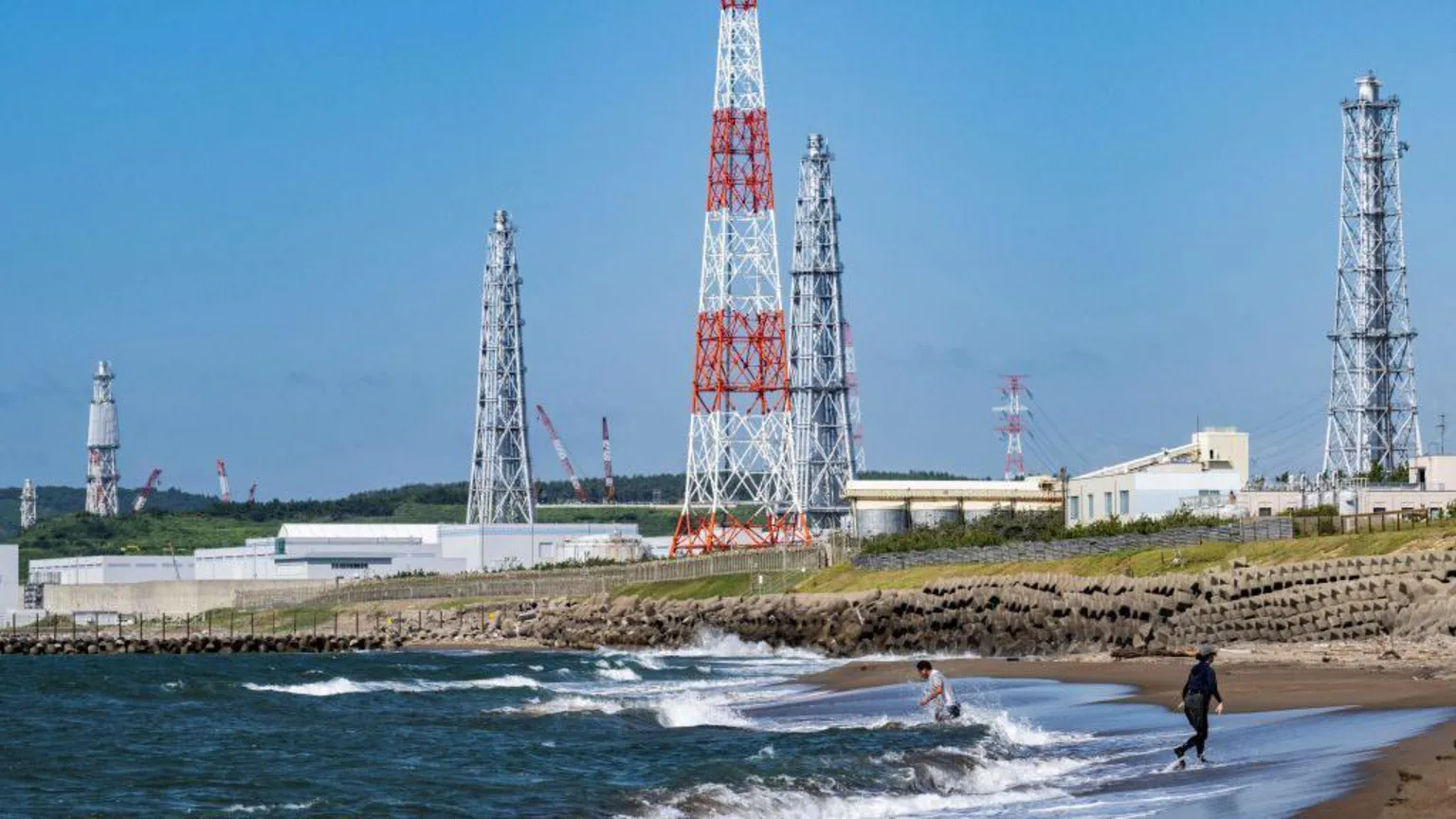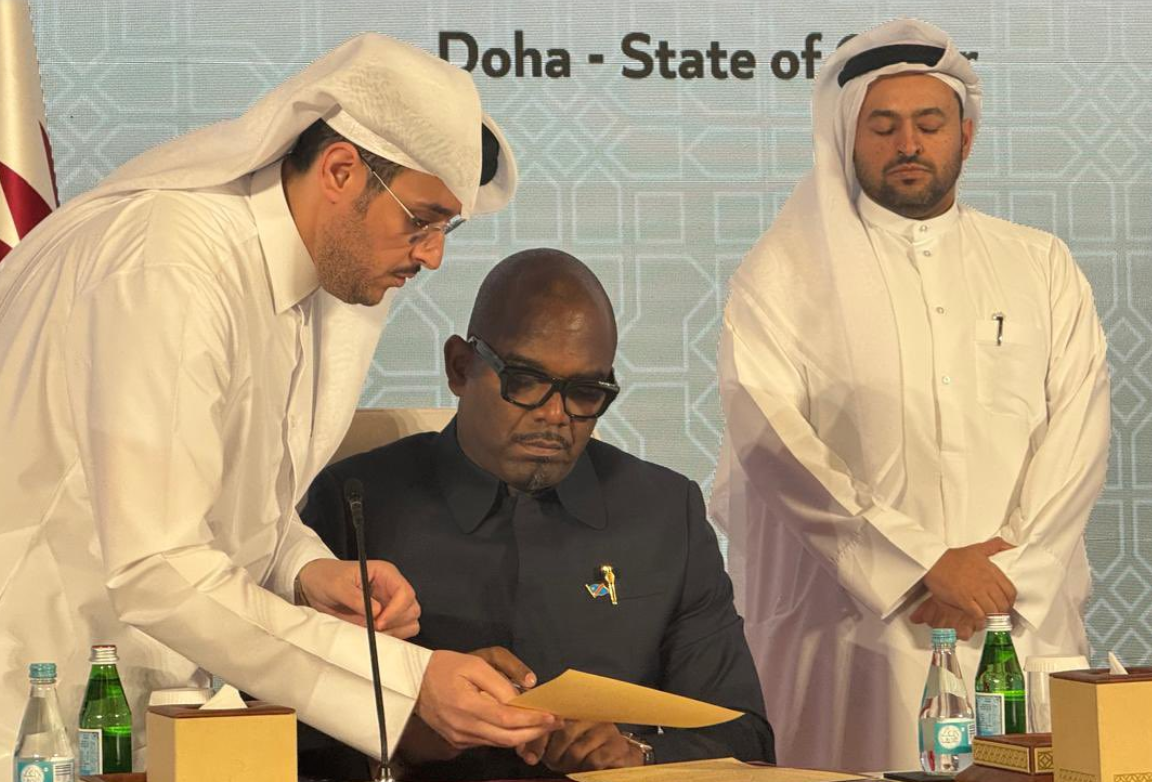A major step toward ending years of bloodshed in eastern Democratic Republic of the Congo (DRC) has been taken in Doha, Qatar, where the DRC government and the M23 rebel group signed a historic Declaration of Principles this July 19, 2025.
Brokered by the State of Qatar with backing from the United States and the African Union, this agreement sets a path toward a comprehensive peace deal within coming days or weeks, aimed at resolving one of Africa’s most prolonged and devastating conflicts.
The signing ceremony in Doha was attended by senior Qatari diplomats, U.S. representatives, AU officials, and regional envoys. The document outlines a series of commitments both sides have agreed to as they move toward a final peace accord.
The peace effort is part of a broader dual-track initiative—known as the Doha and Washington Tracks—meant to consolidate regional diplomacy and finally bring peace to North Kivu and surrounding provinces in eastern DRC.
The eastern DRC has suffered through multiple waves of conflict for more than two decades. M23, resurfaced in recent years, launching offensives in 2022 and again in early 2025.
In a matter of weeks, the group took control of key cities including Goma and Bukavu, and triggering warnings of a broader regional war.
How Peace Talks Progressed
After months of shuttle diplomacy and growing international concern, the governments of Rwanda and the DRC agreed to attend peace talks in Doha, hosted by Qatar.
In March 2025, President Paul Kagame and President Félix Tshisekedi of the DRC held their first face-to-face meeting in years, agreeing to an immediate ceasefire.
That meeting set the tone for direct negotiations between Kinshasa and M23, mediated by Qatari diplomats and backed by the U.S. State Department.
The breakthrough came in June when the United States hosted Congolese and Rwandan delegations at the White House. There, the two countries signed the Washington Accord, a key framework agreement witnessed by U.S. President Donald Trump.
Trump hailed the deal as a “defining moment for peace in central Africa,” warning both sides that violations would attract “severe consequences—financial or otherwise.”

Declaration of Principles: What’s in the Agreement?
The 13-page Declaration of Principles signed in Doha contains several core components:
1. Commitment to Peace and Sovereignty
Both sides reaffirmed respect for the sovereignty of the DRC and their commitment to peaceful conflict resolution. The document emphasizes national unity, civilian protection, and the rejection of hate speech and sectarian propaganda.
It also makes reference to the Joint Declaration of April 23, 2025, where both sides agreed to peaceful negotiations.
2. Permanent Ceasefire
A comprehensive ceasefire comes into effect immediately. Both parties agreed to stop all military actions—whether by land, air, or lake—along with other provocations such as propaganda or sabotage.
An Oversight and Verification Mechanism will be established, with likely involvement from MONUSCO (the UN peacekeeping mission in the DRC), the African Union, and Qatari observers.
3. Confidence-Building Measures
To build trust, the two parties agreed to:
- Set up an ICRC-facilitated mechanism for the release of prisoners held by either side.
- Guarantee safety and transparency to civilians in conflict areas.
- Avoid inflammatory public statements.
These are designed to prevent the ceasefire from breaking down as negotiations advance.
4. Restoring Government Authority
M23 currently controls several strategic towns in eastern DRC. Under the agreement, a phased process will return control to Congolese civilian authorities, including the deployment of police, civil servants, and local administrators.
This sensitive transition will be done in stages, in consultation with community leaders, to avoid clashes.
Do you want a job? Please kindly click here
5. Return of Displaced Persons
A central pillar of the deal is the safe and voluntary return of more than one million displaced civilians.
The DRC government and M23 agreed to cooperate with UNHCR and regional governments on implementing tripartite repatriation agreements. The declaration emphasizes the need to ensure dignity and security for returning refugees and IDPs.
6. Role of MONUSCO and Regional Bodies
MONUSCO’s mandate will be extended to help monitor the ceasefire, support disarmament, and assist with civilian protection. The agreement also calls for support from regional mechanisms, including the International Conference on the Great Lakes Region (ICGLR) and the East African Community.
7. Roadmap to Final Peace Agreement
The declaration sets tight timelines:
- Within 10 days, implementation of the agreement must begin.
- Direct talks will commence no later than 10 days after implementation starts.
- Negotiations will follow the Washington Accord roadmap.
- A final, legally binding peace agreement is to be signed within 7–10 days of the start of those talks.
The Human Side of the War

During the Doha talks, both sides acknowledged the immense suffering endured by civilians. Entire towns have been emptied, families split apart, and schools and hospitals destroyed.
In a joint statement after the signing, representatives from both delegations said: “We commit to turning the page on violence. Our people deserve peace, dignity, and the chance to rebuild their lives.”
One delegate added, “This is not a victory for any one side. It’s a victory for every Congolese child who wants to go to school and every mother who wants to return home.”
International Reactions
Qatar
Qatar’s foreign ministry welcomed the signing, describing it as “a landmark in African diplomacy and a demonstration of what regional dialogue can achieve.”
United States
The White House issued a statement expressing support, noting that the declaration aligns with the principles of the Washington Accord.
U.S. senior envoy Massad Boulos said: “We worked hard to align the Doha and Washington tracks. The world was watching, and both sides delivered.”
African Union and UN
The AU Commission Chairperson applauded the agreement and offered continued support through AU peace and security organs. The UN Secretary-General’s Special Envoy for the Great Lakes Region urged all parties to move quickly from words to action.
The Road Ahead: Difficult but Possible
Though the signing in Doha is an important milestone, analysts warn that many past peace deals have collapsed. The region remains volatile, and trust between parties is low.
Key risks include:
- Spoilers within the M23 or Congolese military who may oppose the deal.
- Delays or failures in reintegration of M23 fighters.
- Political instability ahead of upcoming DRC elections.
- The return of displaced populations to contested areas.
- Justice for war crimes and ensuring accountability.
Still, this is the first time since the 2013 Kampala talks that the Congolese government and M23 have reached an agreement this detailed and comprehensive.
A Defining Moment
The peace process is far from over, but the declaration marks a bold first step.
If the commitments are followed through, observers say the agreement could stabilize eastern Congo and restore relations with Rwanda, whose alleged involvement with M23 has long strained ties with Kinshasa.
Final talks for the comprehensive peace agreement are expected in Washington D.C., where President Kagame and Presidents Tshisekedi are scheduled to meet later this month to finalize a regional security framework and announce a new cross-border economic cooperation pact.
For millions of Congolese citizens and refugees, the hope is that peace will at last become more than just a promise on paper.










